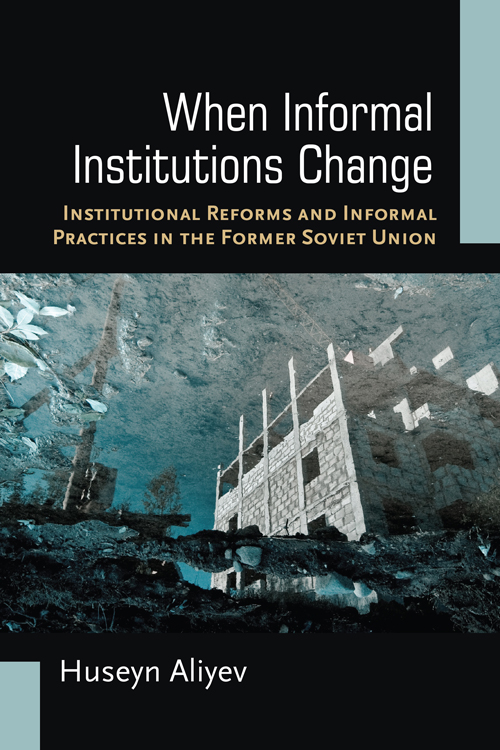Kolloquiumsvortrag
18:15 Uhr, / Zoom
Benjamin Goossen (Boston)
Mennonites and Lebensraum. Situating a Christian Denomination in Hitlers Empire.
Wissenswertes
Huseyn Aliyev
When Informal Institutions Change. Institutional Reforms and Informal Practices in the Former Soviet Union
University of Michigan Press, Michigan 2017, ISBN 978-0-472-13047-4
Huseyn Aliyev examines how, when, and under which conditions democratic institutional reforms affect informal institutions in hybrid regimes, or countries transitioning to democracy. He analyzes the impact of institutional changes on the use of informal practices and what happens when democratic reforms succeed. Does informality disappear, or do elites and populations continue relying on informal structures?
When Informal Institutions Change engages with a growing body of literature on informal practices and institutions in political science, economics, sociology, and beyond. Aliyev proposes expanding the analysis of the impact of institutional reforms on informal institutions beyond disciplinary boundaries, and combines theoretical insights from comparative politics with economic and social theories on informal relations. In addition, Aliyev offers insights that are relevant to democratization, institutionalism, and human geography. Detailed case studies of three transitional post-Soviet regimes—Georgia, Moldova, and Ukraine—illustrate the contentious relationship between democratic institutional reforms and informality in the broader post-Soviet context.
Aliyev shows that in order for institutional reform to succeed in strengthening, democratizing, and formalizing institutions, it is important to approach informal practices and institutions as instrumental for its effectiveness. These findings have implications not only for hybrid regimes, but also for other post-Soviet or post-communist countries.
"An impressive accomplishment. Aliyev engages with numerous literatures from multiple disciplines to provide valuable insights into both the durability and the malleability of informal practices in post-Soviet politics. For theoretical as well as geopolitical reasons, his selection of Georgia, Ukraine and Moldova for detailed comparative case studies could not be more opportune.”
— William Reisinger, University of Iowa
“The book makes an excellent contribution to the literature and provides a timely analysis of the three important countries that it examines. The book will definitely be sought after by scholars working to understand the prospects for reform in the former Soviet Union.”
—Robert Orttung, The George Washington University

When Informal Institutions Change. Institutional Reforms and Informal Practices in the Former Soviet Union
University of Michigan Press, Michigan 2017, ISBN 978-0-472-13047-4
Huseyn Aliyev examines how, when, and under which conditions democratic institutional reforms affect informal institutions in hybrid regimes, or countries transitioning to democracy. He analyzes the impact of institutional changes on the use of informal practices and what happens when democratic reforms succeed. Does informality disappear, or do elites and populations continue relying on informal structures?
When Informal Institutions Change engages with a growing body of literature on informal practices and institutions in political science, economics, sociology, and beyond. Aliyev proposes expanding the analysis of the impact of institutional reforms on informal institutions beyond disciplinary boundaries, and combines theoretical insights from comparative politics with economic and social theories on informal relations. In addition, Aliyev offers insights that are relevant to democratization, institutionalism, and human geography. Detailed case studies of three transitional post-Soviet regimes—Georgia, Moldova, and Ukraine—illustrate the contentious relationship between democratic institutional reforms and informality in the broader post-Soviet context.
Aliyev shows that in order for institutional reform to succeed in strengthening, democratizing, and formalizing institutions, it is important to approach informal practices and institutions as instrumental for its effectiveness. These findings have implications not only for hybrid regimes, but also for other post-Soviet or post-communist countries.
"An impressive accomplishment. Aliyev engages with numerous literatures from multiple disciplines to provide valuable insights into both the durability and the malleability of informal practices in post-Soviet politics. For theoretical as well as geopolitical reasons, his selection of Georgia, Ukraine and Moldova for detailed comparative case studies could not be more opportune.”
— William Reisinger, University of Iowa
“The book makes an excellent contribution to the literature and provides a timely analysis of the three important countries that it examines. The book will definitely be sought after by scholars working to understand the prospects for reform in the former Soviet Union.”
—Robert Orttung, The George Washington University
Länder-Analysen
Die Länder-Analysen bieten regelmäßig kompetente Einschätzungen aktueller politischer, wirtschaftlicher, sozialer und kultureller Entwicklungen in Mittel- und Osteuropa sowie Zentralasien. Alle Länder-Analysen können kostenlos abonniert werden und sind online archiviert.
» Länder-Analysen
» Eastern Europe - Analytical Digests
» Länder-Analysen
» Eastern Europe - Analytical Digests
Discuss Data
Archiving, sharing and discussing research data on Eastern Europe, South Caucasus and Central AsiaOnline-Dossiers zu
» Erdgashandel
» Hier spricht das Archiv
» Russian street art against war
» Dissens in der UdSSR
» Duma-Debatten
» 20 Jahre Putin
» Protest in Russland
» Annexion der Krim
» sowjetischem Truppenabzug aus der DDR
» Mauerfall 1989

